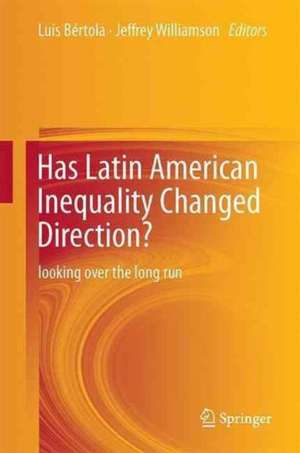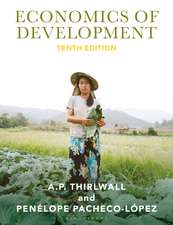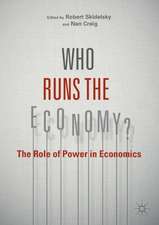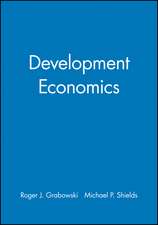Has Latin American Inequality Changed Direction?: Looking Over the Long Run
Editat de Luis Bértola, Jeffrey Williamsonen Limba Engleză Hardback – 2 feb 2017
This book brings together a range of ideas and theories to arrive at a deeper understanding of inequality in Latin America and its complex realities. To so, it addresses questions such as: What are the origins of inequality in Latin America? How can we create societies that are more equal in terms of income distribution, gender equality and opportunities? How can we remedy the social divide that is making Latin America one of the most unequal regions on earth? What are the roles played by market forces, institutions and ideology in terms of inequality?
In this book, a group of global experts gathered by the Institute for the Integration of Latin America and the Caribbean (INTAL), part of the Inter-American Development Bank (IDB), show readers how various types of inequality, such as economical, educational, racial and gender inequality have been practiced in countries like Brazil, Bolivia, Chile, Mexico and many others through the centuries.
Presenting new ideas, new evidence, and new methods, the book subsequently analyzes how to move forward with second-generation reforms that lay the foundations for more egalitarian societies. As such, it offers a valuable and insightful guide for development economists, historians and Latin American specialists alike, as well as students, educators, policymakers and all citizens with an interest in development, inequality and the Latin American region.
| Toate formatele și edițiile | Preț | Express |
|---|---|---|
| Paperback (1) | 428.84 lei 6-8 săpt. | |
| Springer International Publishing – 12 iul 2018 | 428.84 lei 6-8 săpt. | |
| Hardback (1) | 436.35 lei 6-8 săpt. | |
| Springer International Publishing – 2 feb 2017 | 436.35 lei 6-8 săpt. |
Preț: 436.35 lei
Nou
Puncte Express: 655
Preț estimativ în valută:
83.52€ • 90.75$ • 70.20£
83.52€ • 90.75$ • 70.20£
Carte tipărită la comandă
Livrare economică 21 aprilie-05 mai
Preluare comenzi: 021 569.72.76
Specificații
ISBN-13: 9783319446202
ISBN-10: 3319446207
Pagini: 520
Ilustrații: VIII, 419 p. 90 illus., 59 illus. in color.
Dimensiuni: 155 x 235 x 24 mm
Greutate: 0.77 kg
Ediția:1st ed. 2017
Editura: Springer International Publishing
Colecția Springer
Locul publicării:Cham, Switzerland
ISBN-10: 3319446207
Pagini: 520
Ilustrații: VIII, 419 p. 90 illus., 59 illus. in color.
Dimensiuni: 155 x 235 x 24 mm
Greutate: 0.77 kg
Ediția:1st ed. 2017
Editura: Springer International Publishing
Colecția Springer
Locul publicării:Cham, Switzerland
Cuprins
INTRODUCTION.- Chapter1. Long-run inequality trends and cycles and the recent inequality downturn in Latin America.- PART I. LONG-RUN TRENDS.- Chapter 2. Functional Inequality in Latin America: News from the Twentieth Century.- Chapter 3. The Political Economy of Income Inequality in Chile since 1850.- Chapter 4. What Human Heights Can Explain about the Evolution of Living Standards and Inequality in Latin America: the Case of Mexican Females and Males, 1850-1992.- Chapter 5. Long-run Human Development in Mexico: 1895-2010.- Chapter 6. Inequality, Institutions, and Long-Term Development: A Perspective from Brazilian Regions.- Chapter 7. Historical perspectives on regional income inequality in Brazil, 1872-2000.- Chapter 9. Racial Inequality in Brazil from Independence to Present.- Chapter 10. The lingering face of gender inequality in Latin America.- Chapter 11. Fiscal Redistribution in Latin America since the Nineteenth Century.- PART II. THE RECENT INEQUALITY DOWNTURN.- Chapter 12. Inequality in Latin America.- Chapter 13. The Inequality Story in Latin America and the Caribbean: Searching for an Explanation.- Chapter 14. The Political Economy of Inequality at the Top in Contemporary Chile.- Chapter 15. Structural change and the fall of income inequality in Latin America - Agricultural development, inter-sectoral duality and the Kuznets curve.- Chapter 16. Fiscal policy and inequality in Latin America 1960-2012.- Chapter 17. Challenges for Social Policy in a Less Favorable Macroeconomic Context.
Notă biografică
Luis Bértola (Universidad de la República, Uruguay)
Professor at the Economic and Social History Program, director of the Ph.D. and Master Programme, since 2005; Visiting Professor at the University of Gothenburg since 2010; Member of the Bureau of the International Economic History Association 2009-2015; CEPR Associate; member of the Figuerola Institute, Universidad Carlos III, Madrid; Director of the Montevideo-Oxford Latin American Economic History Data Base. Was editor of the Journal of Iberian and Latin American Economic History Review. Co-author of The Economic Development of Latin America since Independence (Oxford University Press, 2012) and of several articles and book chapters of international publications during the last years. Has been advisor for ECLAC, IADB, ILO, NU and several national institutions in Uruguay and Latin America.
Jeffrey G. Williamson (Harvard University and University of Wisconsin-Madison)
The Laird Bell Professor of Economics, emeritus, Harvard University and Honorary Fellow, Department of Economics, University of Wisconsin-Madison, Williamson is past President of the Economic History Association (1994-1995), Chairman of the Harvard Economics Department (1997-2000), and Master of Harvard’s Mather House (1986-1993).
Professor at the Economic and Social History Program, director of the Ph.D. and Master Programme, since 2005; Visiting Professor at the University of Gothenburg since 2010; Member of the Bureau of the International Economic History Association 2009-2015; CEPR Associate; member of the Figuerola Institute, Universidad Carlos III, Madrid; Director of the Montevideo-Oxford Latin American Economic History Data Base. Was editor of the Journal of Iberian and Latin American Economic History Review. Co-author of The Economic Development of Latin America since Independence (Oxford University Press, 2012) and of several articles and book chapters of international publications during the last years. Has been advisor for ECLAC, IADB, ILO, NU and several national institutions in Uruguay and Latin America.
Jeffrey G. Williamson (Harvard University and University of Wisconsin-Madison)
The Laird Bell Professor of Economics, emeritus, Harvard University and Honorary Fellow, Department of Economics, University of Wisconsin-Madison, Williamson is past President of the Economic History Association (1994-1995), Chairman of the Harvard Economics Department (1997-2000), and Master of Harvard’s Mather House (1986-1993).
Textul de pe ultima copertă
This book is open access under a CC BY 4.0 license.
This book brings together a range of ideas and theories to arrive at a deeper understanding of inequality in Latin America and its complex realities. To so, it addresses questions such as: What are the origins of inequality in Latin America? How can we create societies that are more equal in terms of income distribution, gender equality and opportunities? How can we remedy the social divide that is making Latin America one of the most unequal regions on earth? What are the roles played by market forces, institutions and ideology in terms of inequality?
In this book, a group of global experts gathered by the Institute for the Integration of Latin America and the Caribbean (INTAL), part of the Inter-American Development Bank (IDB), show readers how various types of inequality, such as economical, educational, racial and gender inequality have been practiced in countries like Brazil, Bolivia, Chile, Mexico and many others through the centuries.
Presenting new ideas, new evidence, and new methods, the book subsequently analyzes how to move forward with second-generation reforms that lay the foundations for more egalitarian societies. As such, it offers a valuable and insightful guide for development economists, historians and Latin American specialists alike, as well as students, educators, policymakers and all citizens with an interest in development, inequality and the Latin American region.
This book brings together a range of ideas and theories to arrive at a deeper understanding of inequality in Latin America and its complex realities. To so, it addresses questions such as: What are the origins of inequality in Latin America? How can we create societies that are more equal in terms of income distribution, gender equality and opportunities? How can we remedy the social divide that is making Latin America one of the most unequal regions on earth? What are the roles played by market forces, institutions and ideology in terms of inequality?
In this book, a group of global experts gathered by the Institute for the Integration of Latin America and the Caribbean (INTAL), part of the Inter-American Development Bank (IDB), show readers how various types of inequality, such as economical, educational, racial and gender inequality have been practiced in countries like Brazil, Bolivia, Chile, Mexico and many others through the centuries.
Presenting new ideas, new evidence, and new methods, the book subsequently analyzes how to move forward with second-generation reforms that lay the foundations for more egalitarian societies. As such, it offers a valuable and insightful guide for development economists, historians and Latin American specialists alike, as well as students, educators, policymakers and all citizens with an interest in development, inequality and the Latin American region.
Caracteristici
This book demonstrates a detailed and comprehensive study of recent trends in inequality in Latin America
It challenges the reader to ponder whether Latin America has worked out its inequalities since it independencies time to the current years
It offers the perspective of international developing institutions such as the World Bank and the Inter-American Development Bank on the matter
Includes supplementary material: sn.pub/extras
It challenges the reader to ponder whether Latin America has worked out its inequalities since it independencies time to the current years
It offers the perspective of international developing institutions such as the World Bank and the Inter-American Development Bank on the matter
Includes supplementary material: sn.pub/extras











